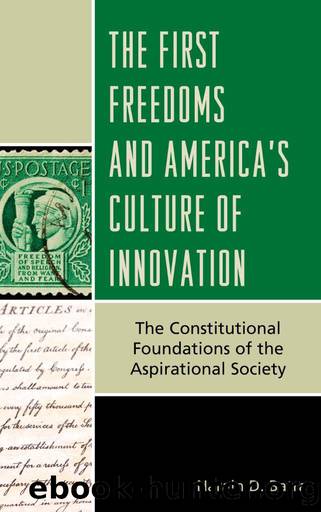The First Freedoms and America's Culture of Innovation by Batra Narain D.;

Author:Batra, Narain D.;
Language: eng
Format: epub
Tags: undefined
Publisher: Rowman & Littlefield Publishers
Published: 2012-08-15T00:00:00+00:00
Challenging Authority
The first significant challenge as to the rightful place of commercial speech in American society came from an adventurous and resourceful showman, F. J. Chrestensen. In 1940 Chrestensen bought an old navy submarine in Florida and hauled it to dock at New York port on the East River across from the Statue of Liberty in order to turn it into an exhibition piece so that people could see how a submarine worked from the inside. The goal was not to educate people but to make money. To attract visitors to the submarine, Chrestensen distributed leaflets in the city to promote his enterprise, but unfortunately he violated the cityâs antilittering code that disallowed the distribution of handbills of a commercial nature, albeit one could distribute political and informational handouts.
Not deterred by legal niceties, Chrestensen printed another set of leaflets that contained a political protest against the high-handedness and the unfairness of the cityâs ordinance on one side and the commercial message inviting people to visit the submarine on the other. The city authorities were not persuaded by his innovative gimmick and banned the distribution of handbills. The stakes were too high for Chrestensen, but he did not quit his quest quietly. He obtained an injunction from the federal district court against the enforcement of the ordinance, which was affirmed by the federal appeals court. The city police commissioner, Lewis J. Valentine, took the case to the U.S. Supreme Court. The Court ruled that the First Amendment did not give protection to âpurely commercial advertisingâ from government regulation.[5]
Historically the importance of the Chrestensen case does not lie in the fact that the Supreme Court affirmed the subservient status of commercial speech; rather, the case is significant because beginning with the First World War and the Espionage Act of 1919, Americans had begun to test the boundaries of the First Amendment in all their activities. The state could regulate advertisement on the grounds that it is a vehicle for selling a product. But what if advertisement were used as a protest platform, or if it sold a political idea! In a 1964 landmark case New York Times v. Sullivan, the Court ruled that political ideas expressed as advertisement have the full protection of the First Amendment, even if they contain inaccuracies and falsehood, so long they are not intentional or show reckless disregard of the truth. Although it is difficult to say that the Sullivan case affected the Supreme Courtâs view about commercial speech, in the mid-1970s the Court started to reconsider its position on the importance of commercial speech in the daily lives of the American people.
In 1971 the Virginia Weekly published an advertisement informing its readers in Virginia, where abortion was illegal, about the availability of abortion services at affordable rates at the Womenâs Pavilion and several accredited clinics and hospitals in New York City, where abortion was legal. Since under Virginia state law it was illegal to advertise for abortion services, Jeffrey C. Bigelow, the Weeklyâs editor, was convicted for misdemeanor.
Download
This site does not store any files on its server. We only index and link to content provided by other sites. Please contact the content providers to delete copyright contents if any and email us, we'll remove relevant links or contents immediately.
Cecilia; Or, Memoirs of an Heiress — Volume 1 by Fanny Burney(32548)
Cecilia; Or, Memoirs of an Heiress — Volume 2 by Fanny Burney(31947)
Cecilia; Or, Memoirs of an Heiress — Volume 3 by Fanny Burney(31932)
The Lost Art of Listening by Michael P. Nichols(7494)
Asking the Right Questions: A Guide to Critical Thinking by M. Neil Browne & Stuart M. Keeley(5762)
We Need to Talk by Celeste Headlee(5608)
On Writing A Memoir of the Craft by Stephen King(4935)
Dialogue by Robert McKee(4389)
Pre-Suasion: A Revolutionary Way to Influence and Persuade by Robert Cialdini(4224)
I Have Something to Say: Mastering the Art of Public Speaking in an Age of Disconnection by John Bowe(3878)
Elements of Style 2017 by Richard De A'Morelli(3343)
The Book of Human Emotions by Tiffany Watt Smith(3303)
Fluent Forever: How to Learn Any Language Fast and Never Forget It by Gabriel Wyner(3079)
Name Book, The: Over 10,000 Names--Their Meanings, Origins, and Spiritual Significance by Astoria Dorothy(2980)
Good Humor, Bad Taste: A Sociology of the Joke by Kuipers Giselinde(2945)
Why I Write by George Orwell(2945)
The Art Of Deception by Kevin Mitnick(2796)
The Grammaring Guide to English Grammar with Exercises by Péter Simon(2740)
Ancient Worlds by Michael Scott(2682)
